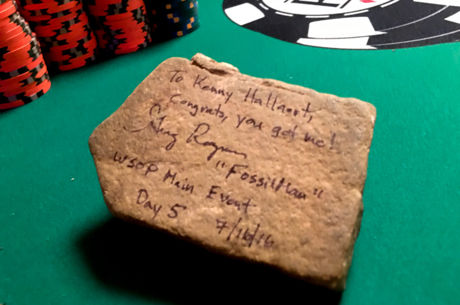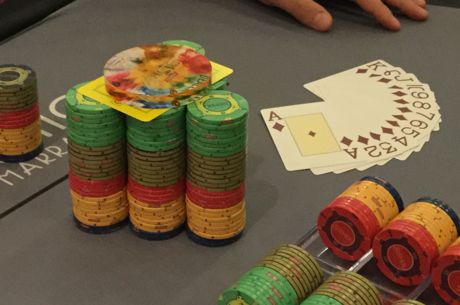What You Can and Can't Control in Poker, and Why It Matters

Back in 2007 during the heyday of televised poker, an interesting moment occurred near the end of one of Shannon Elizabeth's matches during her deep run to the semifinals in the NBC National Heads-Up Poker Championship.
It was the last hand of Elizabeth's quarterfinal match against Humberto Brenes. The players were all in before the flop, and Elizabeth had the chip edge and the better cards with K♥10♠ while Brenes had K♦3♦.
As they waited for the dealer to produce the first three community cards, Elizabeth can be heard chanting, "Ten, ten, ten."
This is not too strange, as it is natural to hope for a card that will strengthen one's position. It does not require any supernatural belief to possess such hope. But immediately thereafter, Elizabeth hears one of her supporters mention a "three." She quickly turns, hold up the palm of her hand to this friend, and earnestly rebukes him.
"Don't call for that," she says. "Don't call for what you don't want, call for what you do want. Please. Ten. Seriously. Ten. Law of attraction. Ten."
That "law of attraction" she mentions is the idea — popularized in several books — that if you fill your mind with images of what you want, the universe will bring those things to you. Elizabeth made her belief in this idea explicit in an interview earlier in the same tournament.
"One of the biggest things, like a change that I've been making just in my overall life, is the law of attraction and positive energy, and really trying to, to picture the cards I need and not to picture the cards I don't want, because I don't want to attract those cards," she explains.
Some might remember from that same year how Jerry Yang displayed a similar attitude on his path to winning the World Series of Poker Main Event. At one point in the tournament, Yang was short-stacked and all in before the flop with 4x4x, and was up against a higher pocket pair. He prayed, "Lord, give me a set."
Note here that the order of the deck in the dealer's hand was already determined, and there were no decisions left to be made by either player. For Yang's words to make any sense, he must have believed that a supernatural being would be able somehow to switch the cards around in the dealer's hand, in order to produce a favorable outcome for him. This is the same belief as Elizabeth's, except that it's conceived as operating through a specific supernatural being, rather than through the universe as a whole.
The Illusion of Control
We humans like being in control. We detest and fear situations in which we have no control. For example, despite statistics to the contrary, we feel safer driving a car than flying in a commercial jet. One of the reasons for this is that being in control of the car produces an illusion of safety, while the feeling of having no control over the plane can produce an illusion of grave danger.
Studies in experimental psychology have shown that when we have no control over a situation in which the outcome matters to us, we tend to construct a false sense of control. This phenomenon is especially pronounced in stressful, competitive, and emotion-laden situations (such as come up in poker time and time again).
This phenomenon is largely responsible for the creation of superstitions. Tribes perform special dances to make it rain. Fans turn "rally caps" backwards to help a sports team. Batters cross themselves for better performance, while pitchers avoid stepping on a baseline on the way to the mound to prevent a bad inning. Gamblers refuse to touch $50 bills, having heard that they bring bad luck.
All such beliefs and practices are wholly irrational.
You might agree with that analysis, but still hold out some sympathy for those who hold such superstitions and/or beliefs, thinking that while they might be pointless and/or silly, they're harmless. I submit that they are not harmless.
In a fascinating 2003 study, a team of British researchers recruited 107 stockbrokers to participate in an experiment. The subjects watched a trend line develop on a computer screen, much like that traced by the rising and falling price of an individual stock or the market as a whole over the course of a day. They were given a mouse, and told that clicking the mouse "may" influence the direction of the advancing line. In reality, the mouse did nothing at all, and the line moved up or down at random. At the conclusion of the session, the subjects were asked to judge how much effect their clicking had had on whether the line moved up or down.
The key finding was that there was a strong inverse correlation between a subject's belief in how he had influenced the line and his previous performance as a stockbroker. That is, those who made the least money and were rated the poorest performers by their supervisors were the ones who were most subject to the illusion that they had controlled the direction of the line.
The correct interpretation is not that being a bad stockbroker causes you develop an illusion of control. Rather, the more you carry around an illusion of control, the worse you are likely to be as a stockbroker. You can't properly analyze complex phenomena if you are highly prone to false, illusory views about causes and effects.
What Is Under Your Control, and What Is Not
Poker is a similarly complex phenomenon. You need to have a rigorously rational, clear, strong conception of what you do and do not control, or you simply won't be able to make consistently correct decisions.
Let's be explicit about the most obvious example of what you can't control. You have no power over what cards you are dealt, what cards your opponents are dealt, or what cards come on the board. Zero. Zip. Nada.
It doesn't matter what "lucky" items of clothing you wear, what words you speak to which deity, or what images you call to your mind. Let go of all of that. It's a distraction. Every bit of thought you expend on such things is that much less mental processing power you have to observe tells on other players, estimate their ranges, calculate the probability of hitting an out or getting somebody to fold, evaluate stack-to-pot ratios, and so on.
There's a ton of complicated information that you have to digest in order to come to a correct poker decision. Don't waste it on things that have no bearing on what's going on.
I could list a hundred other things in a poker game that you have no control over, but space is limited. Suffice it to say that you can put everything in the game on that list, with one exception — you. You have control over you.
You have control over your actions, your words, and even your thoughts and emotions, if you learn to exercise it.
You can control where you look, how you sit, how you move.
You can control when you take breaks, what you eat, and whether you consume alcohol.
You can't control whether another player is a jerk — either in general or to you specifically — but you have 100% control over how you respond. You can't control whether the dealer makes a mistake, but you have total control over how you react when it happens.
For cash games, you control where to play, what games and stakes to play, and when to leave.
In any individual hand, you have full and exclusive control over whether you play it at all, and, if you do, how you make every decision as the hand progresses.
I don't know about you, but for me that list of things that I not only can control, but must control, is pretty much all-consuming. I find in myself no room for additionally trying to control all of the stuff that is wholly out of my hands, like a stockbroker clicking a disconnected computer mouse.
Taking Responsibility
Finally, just a bit about the opposite problem — poker players who refuse to acknowledge responsibility for the things that they do, in fact, have control over. If you are in the habit of saying things like, "I had to call," stop. It's a lie. You chose to call. It was entirely up to you, and under your control. Own it.
If you fly off the handle, berating dealers and other players like, say, Phil Hellmuth does, realize that, too, is in the realm of things fully under your control. If you choose to do such things, it's on you. It is not the fault of whatever person or situation you like to think provoked your bad behavior.
You will never become as good a poker player as you could be if you continue to carry around inside your head false perceptions of what you do and do not control about the game. If you have a problem there, that needs to be your top priority for correction.
Robert Woolley lives in Asheville, NC. He spent several years in Las Vegas and chronicled his life in poker on the “” blog.
Want to stay atop all the latest in the poker world? If so, make sure to get PokerNews updates on your social media outlets. on Twitter and find us on both and !









